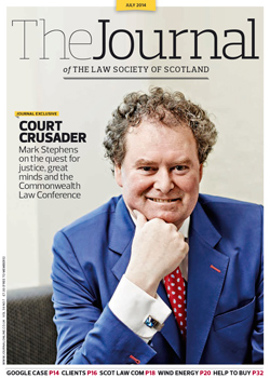Angostura, anyone?

The Scottish Government has recently published its latest proposed reforms to liquor licensing legislation. As this will be the fourth piece of legislation inside a decade, it was hoped that we would have a consolidating statute to make easier reading. Instead, we have the sort of drafting mishmash which was the source of annoyance from Westminster, when a mini-kilt was sewn on to English legislative change.
The bill is named the Air Weapons and Licensing (Scotland) Bill. In addition to airguns and liquor, it deals with taxis, scrap metal and sexual entertainment venues.
On the positive side, many of the dafter topics raised at consultation have been shelved. These included additional police powers to require pubs to close when certain football matches were played; boards having powers to vary licence conditions without a hearing; and boards having an obligation actively to promote each of the licensing objectives. Thankfully, garage forecourt shops have also been left alone.
Additional ground
The police have campaigned for a long time for the return of the “fit and proper person” criterion. This will return as a ground of refusal of a premises or personal licence, and as a ground for review of each. If on review the ground is established, an automatic revocation will follow.
The criticism of this test was that it was applied very differently throughout the country. From the licensee’s point of view, one potential saving grace is that the board must have regard to the licensing objectives. The test usually comes into play following a conviction. The rider relating to the licensing objectives means that to an extent, the party in the spotlight can have some protection through Brightcrew. Suggestions at consultation that the legislation might seek to water down the consequences of Brightcrew have not come to fruition.
On the subject of convictions, it should be noted that s 129(4) has been repealed. That subsection prohibited a board from considering convictions that were spent for the purposes of the Rehabilitation of Offenders Act 1974. In practice, if the police want to introduce a spent conviction, this will take us back to the two-stage hearing, where the first stage was a debate on whether or not it was appropriate for the spent conviction to be introduced. An unnecessary complication, I believe.
Making work
Overworked clerks will be pleased that they will no longer have to produce a licensing policy every three years. Sensibly, the interval for this has been extended by reference to council elections.
In the overprovision part of the policy, it has been confirmed that a board may look at its whole area as one unit when assessing overprovision. But I am certain that those same clerks and council finance directors will have been as stunned as I was by the new duty on boards to produce a financial report showing their income and expenditure and an explanation as to how the amounts in the statement were calculated. This has to be done within three months of the end of each financial year. I can hear the screams as we speak.
Licensees will no longer be subject to prosecution for failing to notify changes in the details of “interested parties”. Some lip service is being paid to the problems anticipated through revocation of personal licences for failure to comply with the training regulations. Your licence will still be revoked if you don’t retrain and exhibit evidence of this timeously; however, you will be able to apply for a new licence without waiting five years.
Most disappointing were the topics which were not covered, despite significant lobbying and their non-controversial nature. There will still be no site-only provisional premises licences. The administrative anomalies relating to variations and transfers have been completely ignored. No time, you may say? Yet an eagle-eyed draftsman had time to check that angostura bitters, first made by Dr Siegert in the town of Angostura, Venezuela, and having an ABV of 44.7%, had no place in the list of exemptions from the meaning of alcohol. Section 2(1)(b)(iv) will be repealed; variations and transfers will be the same old mess. Hey ho.
In this issue
- “The Union and the law” revisited
- Cartels: raising the stakes
- The cooling-off catch
- Attack vectors into the law: smartphones
- Money laundering: the Fourth way
- Has Glasgow morality come to Edinburgh?
- Reading for pleasure
- Opinion: Graeme McCormick
- Book reviews
- Profile
- President's column
- 10-year target
- Headline act
- Forget that you ever knew me
- The cooling-off catch (1)
- Tax devolution: the legal implications
- Ninth life
- Planning: how does the wind blow?
- Going off the rails
- Employee shares? Sort them yourself
- Angostura, anyone?
- National priorities
- Scottish Solicitors' Discipline Tribunal
- People on the move
- Heart of the action
- Helping solicitors on Help to Buy
- Conditions countdown
- Where bullocks fear to roam
- Fit to grant?
- Controlling the risks
- Ask Ash
- Opening up the law
- From the Brussels office
- Law reform roundup
- Post-corroboration Review update






